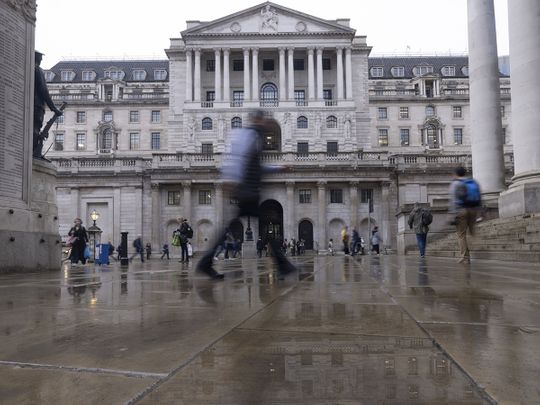
The Bank of England raised interest rates for a ninth time in a row to a 14-year high of 3.5 per cent, pressing ahead with efforts to tame sky-high inflation.
The nine-member Monetary Policy Committee split three ways on the decision as officials tried to balance the risk of inflation getting entrenched against squeezing too hard on growth just as the economy enters a recession.
Six members including Governor Andrew Bailey voted for the half-point rise. Catherine Mann favored three-quarters of a point, while Silvana Tenreyro and Swati Dhingra backed leaving rates unchanged.
“The majority of the committee judged that, should the economy evolve broadly in line with the November Monetary Policy Report Projections, further increases in bank rate may be required,” Bailey wrote in a letter to Chancellor of the Exchequer Jeremy Hunt.
According to the majority, “the labour market remained tight, and there had been evidence that inflationary pressures in domestic prices and wages that could indicate greater persistence and thus justified a further forceful monetary policy response”, minutes of the meeting showed.
For Dhingra and Tenreyro, previous rate rises had yet to have a full impact on the economy and was “more than sufficient” to bring inflation back to target. Mann favoured a bigger increase, saying price and wage pressures would stay strong for longer than projected in November and that pulling forward action will reduce the need to keep hiking well into 2023.
Bailey said inflation may already have peaked, but the risks around that projection are on the “upside” and price growth will remain very high in the next few months.
The panel dropped guidance that it issued in November, when it said the path for interest rates implied by financial markets was too aggressive. The minutes said the majority of the panel now believe further increases in bank rate might be required - if the economy evolves in line with its November forecast.
Officials at the BOE estimate the UK is now in recession, thought the economy is slightly stronger than it anticipated in November. Gross domestic product in the fourth quarter probably will fall 0.1 per cent following a decline of 0.5 per cent in the third quarter, the BOE said.
The government’s fiscal package released last month will support the economy next year but depress output in three year’s time, the BOE said. GDP will be 0.4 per cent stronger at the end of 2023 than previously forecast, but it will be 0.5 per cent weaker at the end of 2025, according to the central bank’s estimates.
The Treasury’s measures will have a small impact on inflation. But a 3,000 pound cap on energy bills from April will bring headline inflation down by 0.75 of a percentage point in the second quarter, the BOE said.
The BOE decision, which takes rates to their highest level since November 2008, came after the US Federal Reserve eased up its tightening plans with a half point rate hike on Wednesday, bringing its target range of 4.25 per cent to 4.5 per cent.
The Fed signalled that the US is now close to the terminal rate, which it estimates at just over 5 per cent. Markets reckon UK rates need to reach about 4.75 per cent.
The BOE is dealing with the highest level of inflation in four decades and signs that it is becoming embedded in wage-setting. That has led to the fastest monetary tightening cycle since the late 1989s. However, official figures this week suggested inflation is now past its peak.
Consumer prices fell from 11.1 per cent in October to 10.7 per cent in November and labour market participation improved, with 76,000 inactive people re-joining the workforce and vacancies falling. However, wages are rising at the fastest pace since in two decades outside the pandemic and inflation remains more than five times the BOE’s 2 per cent target.
The BOE will publish a market notice on Friday outlining the progress of gilt sales under its quantitative tightening program and the operational arrangements for the first quarter of 2023.
The bank said the pace of its gilt sales is running ahead of schedule, which “would permit an earlier unwind of the portfolio than initially anticipated”. The central bank reduced the stock of gilts in its portfolio by 44 billion pounds over 2022 as a whole, bringing government bonds in its Asset Purchase Portfolio to 831 billion pounds.












